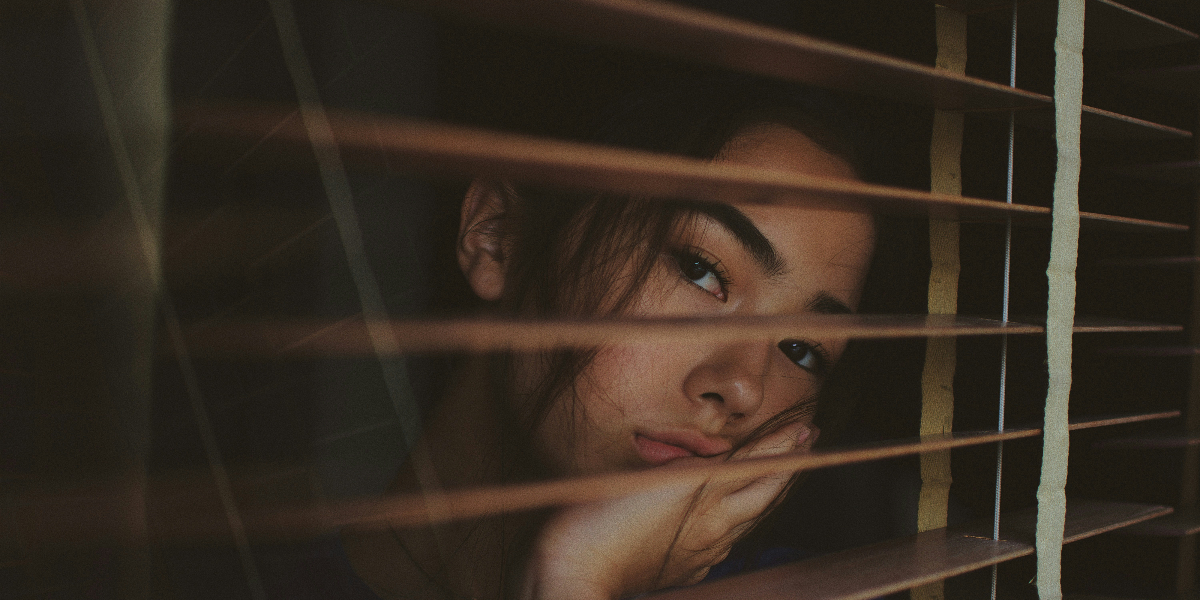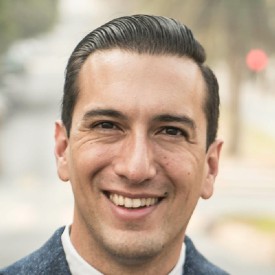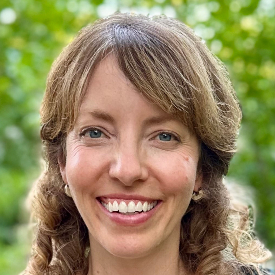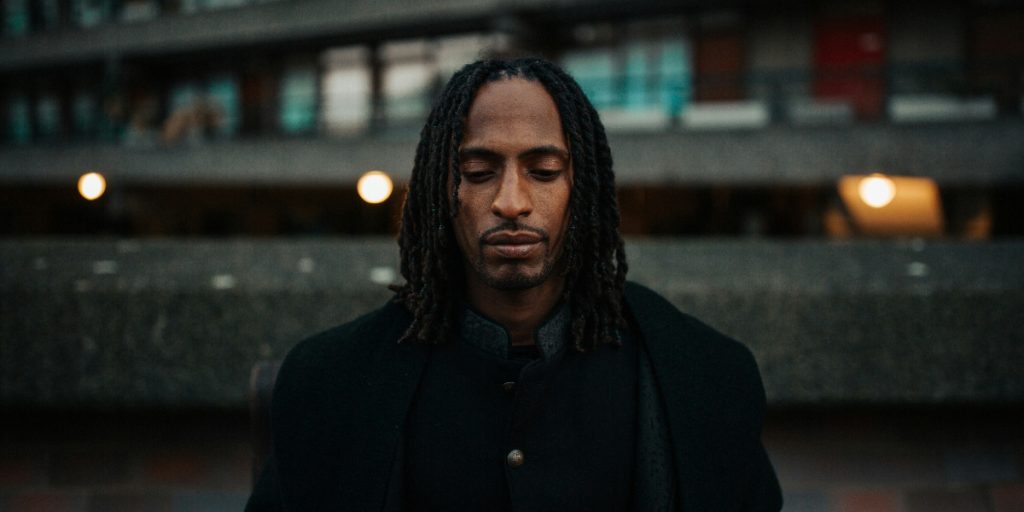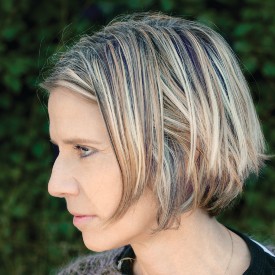Jamil Zaki is a professor of psychology at Stanford University and the director of the Stanford Social Neuroscience Lab. He trained at Columbia and Harvard, studying empathy and kindness in the human brain. He is interested in human connection and how we can learn to connect better.
Below, Jamil shares five key insights from his new book, Hope for Cynics: The Surprising Science of Human Goodness. Listen to the audio version—read by Jamil himself—in the Next Big Idea App.
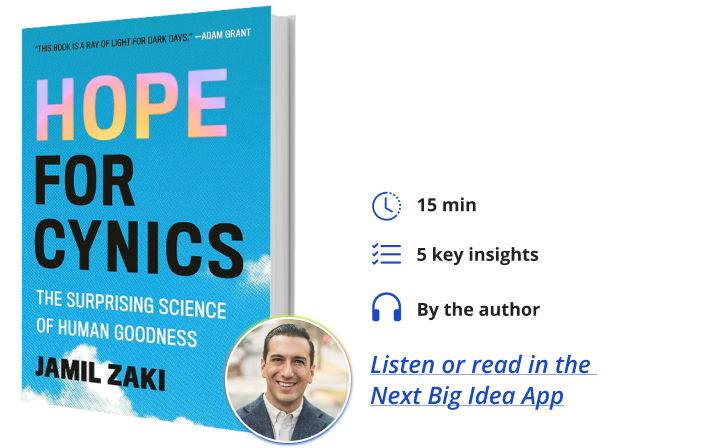
1. Cynicism is a psychological poison.
We can define cynicism as a theory about people. The idea is that humanity, in general, is selfish, greedy, and dishonest. You can test yours right now by seeing whether you agree with these statements:
- No one cares much what happens to you.
- Most people dislike helping others.
- Most people are honest chiefly through fear of getting caught.
If you agree with bleak statements like this, you might be on the cynical side. And if you are, then you are not alone. In 1972, about half of Americans believed that most people can be trusted, but by 2018, that had fallen to a third of Americans. That’s about as big of a drop as the stock market took in the financial collapse of 2008. Cynicism is on the rise, and that’s totally understandable in a world full of corruption and injustice and one in which the media points out negative actions more than positive ones.
But that doesn’t mean that cynicism is helpful. In fact, it hurts us in basically every way psychologists can measure.
Cynics versus non-cynics tend to suffer from more depression, loneliness, and anxiety. Their relationships tend to fracture, as does their health. Cynics, for instance, are more likely to develop diabetes or heart disease and even die younger than non-cynics. Thomas Hobbes once said that people need society because, left to their own devices, life would be nasty, brutish, and short. That is a perfect encapsulation of cynical thinking, but ironically describes cynics themselves better than anyone else.
2. Cynicism is overrated.
If cynical thinking hurts us so much, why do more people adopt it each year? One reason is that our culture glamorizes cynicism in clearly inaccurate ways.
First, we act like it’s wise. In surveys, about 70 percent of people say that cynics are smarter than non-cynics, and about 85 percent say that cynics are socially smarter than non-cynics—for instance, better at spotting liars. In other words, most of us put faith in people who don’t put faith in people. Most of us are wrong. Research shows that cynics perform worse on cognitive tests than non-cynics and are also worse at spotting liars. Cynics already assume the worst, so they stop paying attention to what people are really like.
“Research shows that cynics perform worse on cognitive tests than non-cynics and are also worse at spotting liars.”
Second, we think cynicism is safe even when it’s dangerous. George Carlin once said, “Scratch a cynic, and you’ll find a disappointed idealist.” Many of us adopt cynicism because we’ve been hurt before and don’t want to be hurt again. But by putting up our defenses, we miss out on all sorts of social opportunities for friendship, collaboration, and love. Cynicism is only safe in the way that house arrest is safe.
Third, we think that cynicism is moral, a way of calling out injustice and speaking truth to power, but in fact, it’s more like a tool of the status quo. Cynics see all the problems in society but don’t imagine solutions. Because of this, they are less likely to take part in civic engagement, vote less often, protest less often, and generally give up instead of fighting for a better future. Cynicism doesn’t just break us as individuals but also harms communities.
3. Skepticism is a better approach.
Cynics think like lawyers in the prosecution against humanity. They hyperfocus on any evidence about the harm people do and ignore or explain away all the good that we do. In this way, cynics have more in common with the naive rubes that they often make fun of. A naive truster might focus a lot on other people’s kindness and ignore the harm they do. Both of these groups of people ignore half of the evidence.
Skepticism is different, although it is often confused with cynicism. Skepticism is a hunger for more evidence and information before making a judgment and an unwillingness to sit with our assumptions. If cynics think like lawyers, skeptics think like scientists. This allows them to learn quicker, more agile ways about the world and people around them. It’s also more positive.
Cynicism has brought us to a place in our culture where study after study demonstrates that people underestimate how kind, open-minded, warm, and compassionate the average person tends to be. When we reject cynicism and use skepticism to pay closer attention, pleasant surprises about humanity are everywhere.
4. Hope is not naive.
While cynicism has been glamorized in our culture, hope has been typecast as naïve, privileged, or even toxic—a way of ignoring problems—but that’s not what hope is. Hope is different from optimism. Optimism is the assumption that things will go well. You can think of it as a rose-colored pair of glasses and something that could lead to complacency: If things are going to turn out great, then why should I do anything about it?
“Hopeful people tend to be happier, more resilient, and more efficacious.”
Hope is different. It’s the idea that things could turn out better and that we have a say in shaping how the future unfolds. Because of this, hope is practical and fierce, whereas optimism is easy and passive. Hope also has enormous health benefits, both individual and social.
Hopeful people tend to be happier, more resilient, and more efficacious. They pursue their goals more fiercely and achieve them more often. And hope isn’t just for the privileged—quite the opposite. It’s especially useful for hard times, and people experiencing adversity often tap into hope to fight for their rights. We should rethink hope, not as a pair of rose-colored glasses but as a way of taking off the mud-colored glasses many of us are wearing.
5. Hope is a much-needed skill.
There are lots of ways to replace cynicism with hopeful skepticism. That is, combining an openness to evidence with an understanding that people are probably better than we think. To take on this transformation, here’s where to start:
- First, think differently—I call this fact-checking our cynicism. Next time you find yourself thinking that people are generally terrible or making judgments about someone, ask yourself, what evidence am I basing this on, and is there better data that I could collect to figure out whether I’m right?
- Second, act differently. One way to do this is to take small, calculated leaps of faith in other people, giving them chances to show us who they are.
- Third, share differently. We tend to talk a lot about the worst things that people do, and that type of gossip is understandable, but we might try positive gossip sharing instead. Tell someone the kind and wonderful things you see people doing.
None of this is to say that hope is the answer or that positive thinking will fix the enormous problems we face as a culture. But hope, the idea that things could turn out well, and the empowerment to try to shape the future in positive ways, is especially important during these difficult times. Hope fuels social movements and drives fierce efforts to upend and improve the status quo. We need hope more than ever. Hope is not naive. It’s a magnet pulling us towards a better future—one which we desperately need.
To listen to the audio version read by author Jamil Zaki, download the Next Big Idea App today:












